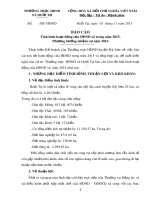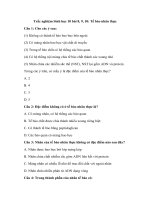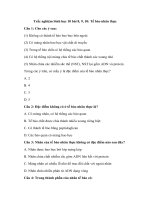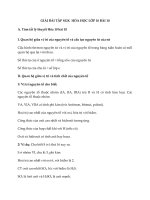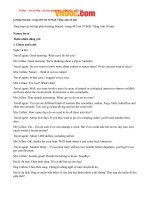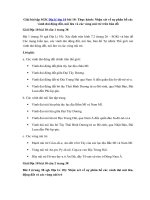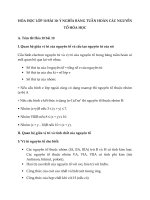Tổng hợp chuyên đề ngữ pháp tiếng anh vào 10
Bạn đang xem bản rút gọn của tài liệu. Xem và tải ngay bản đầy đủ của tài liệu tại đây (7.76 MB, 567 trang )
2022
Tổng hợp chuyên đề ôn
tuyển sinh vào 10 – Ngữ
pháp tiếng Anh
COMPLIED BY CÔ TRANG MINA
TIKTOK: 1.MINUTE.ENGLISH EMAIL:
MỤC LỤC
CHUYÊN ĐỀ 1: THÌ (TENSES)
CHUYÊN ĐỀ 2: THỂ BỊ ĐỘNG (PASSIVE VOICE)
CHUYÊN ĐỀ 3: LỜI NÓI TƯỜNG THUẬT (REPORTED SPEECH)
CHUYÊN ĐỀ 4: SO SÁNH (COMPARISONS)
CHUYÊN ĐỀ 5: MỆNH ĐỀ QUAN HỆ (RELATIVE CLAUSES)
CHUYÊN ĐỀ 6: CÂU ĐIỀU KIỆN (CONDITIONALS)
CHUYÊN ĐỀ 7: CÂU ƯỚC (WISH CLAUSES)
CHUYÊN ĐỀ 8: CÂU HỎI ĐUÔI (TAG QUESTIONS)
CHUYÊN ĐỀ 9: ĐỌC HIỂU (READING COMPREHENSION)
CHUYÊN ĐỀ 10: NGỮ ÂM
CHUYÊN ĐỀ 11: TỪ VỰNG
CHUYÊN ĐỀ 12: ĐIỀN TỪ
CHUYÊN ĐỀ 13: TỪ NỐI
TỔNG HỢP ĐỀ THI VÀO 10
LỜI NĨI ĐẦU
Các em học sinh thân mến!
Cơ là Trang, một cựu học sinh chuyên Anh và hiện tại đang là một giáo viên dạy IELTS tại Hà
Nội. Cũng từng là học sinh hàng ngày tới lớp luyện thi nên cơ rất hiểu khơng phải bạn nào cũng
có điều kiện tham gia lớp học thêm ngồi, vì vậy cơ mong mình có thể góp một phần nhỏ trong
việc ơn thi của các em. Cô tổng hợp tài liệu này với mong muốn các em có thể có cái nhìn tổng
qt nhất về mơn Anh và có thể từ đó tự tin tham gia kỳ thi lớp 10 sắp tới của mình. Cơ tin là chỉ
cần nắm được những chủ điểm ngữ pháp cơ bản này thì các bạn sẽ khơng cịn lo lắng trước kỳ thi
nữa. Đây là món q cô muốn gửi tặng đến tất cả các em đang ôn thi vào 10 nên cô rất mong các
em thấy hữu ích và chia sẻ cho những bạn khác nữa nha. Tài liệu này là tài liệu tổng hợp từ các
nguồn nên cô xin phép sẽ được ghi references ở cuối sách để đảm bảo quyền lợi của tác giả nha.
Nếu có những câu hỏi nào khơng giải quyết được thì em có thể email cho cơ nha. Đây là lần đầu
tiên cô tổng hợp lại các tài liệu nên khó tránh khỏi thiếu sót. Rất mong nhận được những góp ý
chân thành từ các em để tài liệu có thể hồn thiện hơn. Chúc các em ơn thi vui vẻ và đạt được
điểm theo đúng nguyện vọng mình nha~
Fightinggg
Hà Nội,
Cách dùng tài liệu
Dưới đây là những chia sẻ từ q trình cơ ơn thi THPT nên có thể sẽ không phù hợp với một số bạn, tuy nhiên các em có thể
tham khảo nha. Sau khi cơ nắm hết các chuyên đề, cô sẽ mở đề thi thật các năm ra và xác định xem câu này thuộc chuyên đề nào,
nếu mình chưa rõ thì mình nên lướt qua lại các chuyên đề xem nó nằm ở đâu, rồi đọc lại một lượt phần chun đề đó. Ví dụ như
câu 8 trong đề thi khảo sát tiếng Anh THPT 2022 của TP Hà Nội
Question 8: John has a collection of _______ postage stamps
A. Old valuable Japanese
B. old Japanese valuable
C. valuable old Japanese
D. valuable Japanese old
Nếu nhìn qua, các em sẽ thấy ABCD đều là 3 tính từ thay đổi vị trí, vậy đây thuộc chuyên đề trật tự tính từ, nếu em khơng nhớ
trật từ thì có thể lật lại phần đó và xem lại, sau đó tự làm. Từ đây mình sẽ luyện được phản xạ và cách xử lý những câu hỏi trong
kỳ thi THPT. Và nếu các em để ý thì dạng bài mỗi năm khơng hề thay đổi, vẫn sẽ luôn tập trung ở những chun đề này nên
tiếng Anh khơng hề khó đúng khơng~
Đối với những bạn sắp thi, các em có thể làm những đề vào 10 của những năm trước ở tỉnh/thành phố của em (cái này em có thể
xin thầy cơ dạy lớp mình) và làm thử 1 lượt (lưu ý bấm giờ cho cơ hen). Sau đó các em sốt lại đáp án và xem những câu nào
mình sai, rị lại xem các câu đó thuộc chuyên đề nào và đọc lại, đối chiếu lại với câu đó xem liệu lúc này mình đã hiểu phải làm
như nào chưa. Nếu chưa rõ thì các em có thể nhắn cơ ở group discord nha, nhóm này cũng có các anh chị thi THPT nên mọi
người đều có thể giải đáp giúp em.
Chúc các em thi tốt hen, lúc nào có điểm thì khoe với cơ nha <3
CHUYÊN ĐỀ 1: THÌ TRONG TIẾNG ANH
I. LÝ THUYẾT
TENSES
SIMPLE PRESENT
(HIỆN TẠI ĐƠN)
Động từ thường
USE
SIGNAL WORDS
EXAMPLES
- thói quen ở hiện
- always, usually,
- She often goes
tại
often, sometimes,
to school late.
- sự thật, chân lí.
seldom, rarely,
never, every,
- The sun rises in
the east.
normally, regularly,
+: S + V1 / V(s/es)
occasionally, as a
rule …
-: S + don’t/ doesn’t + V1
?: Do/ Does + S +V1 …?
Động từ to be:
S + am/ is / are …
- hành động đang
PRESENT
PROGRESSIVE
(HIỆN TẠI TIẾP DIỄN)
diễn ra vào lúc nói. now, right now, at
- I can’t answer
the phone. I’m
- dự định sẽ thực
present
having a bath.
hiện trong tương
- Look!
- She is going to
lai gần.
- hành động có
+: S + am/is/are + V-ing
- at the moment,
- Listen!
the cinema
tonight.
- Be quiet!
tính chất tạm thời.
- He often goes to
- Keep silence!
work by car, but
-: S + am/ is/ are + not +
Note: một số động
today he is taking
V-ing
từ thường khơng
a bus.
dùng với thì tiếp
diễn: like, dislike,
?: Am / Is /Are + S + V-
hate, love, want,
ing?
prefer, admire,
believe,
understand,
remember, forget,
know, belong,
have, taste, smell,
be
PRESENT PERFECT
(HIỆN TẠI HOÀN
THÀNH)
- hành động bắt
- lately, recently
- I have learnt
đầu trong quá khứ,
(gần đây)
English for five
kéo dài đến hiện
tại và có thể tiếp
tục trong tương lai.
+: S + has / have + P.P
- hành động vừa
mới xảy ra.
- so far, up to now,
up to the present
(cho tới bây giờ)
- already, ever,
never, just, yet, for
-: S + has / have + not +
+ khoảng th/g,
P.P
since + mốc th/g.
- how long …
?: Has / Have + S + P.P?
years.
- this is the first
time/second time…
- many times /
several times
- She has just
received a letter
from her father.
SIMPLE PAST
(QUÁ KHỨ ĐƠN)
+: S + V2 / V-ed
-: S + didn’t + V1
- hành động xảy ra
- yesterday, last
- She went to
và chấm dứt ở một
week, last month,
London last year.
thời điểm xác định
…ago, in 1990, in
trong quá khứ.
the past, …
- The man came
to the door,
- một chuỗi hành
unlocked it,
động xảy ra liên
entered the room,
tục trong quá khứ.
went to the bed
and lay down on
- một thói quen
it.
trong quá khứ
?: Did + S + V1 ….?
- When we were
students, we often
went on a picnic
every weekend.
PAST PROGRESSIVE
(QUÁ KHỨ TIẾP DIỄN)
+: S + was / were + V-ing
-: S + was / were + not +
V-ing
- hành động đang
- at that time, at (9
- He was doing
xảy ra tại một thời
o’clock) last night,
his homework at
điểm xác định
at this time (last
8 o’clock last
trong quá khứ
week),
night.
- hai hành động
- The children
cùng xảy ra đồng
were playing
thời trong quá khứ
football while
their mother was
cooking the meal.
?: Was / Were + S + Ving…?
PAST PERFECT
(QUÁ KHỨ HOÀN
THÀNH
- hành động xảy ra
- already, ever,
- When I arrived
trước hành động
never, before, by,
at the party, they
khác hoặc trước
by the time, after,
had already left.
một thời điểm
until, when, ….
trong quá khứ
- I had
completed the
+: S + had + P.P
English course by
1998.
-: S + hadn’t + P.P
?: Had + S + P.P …?
SIMPLE FUTURE
(TƯƠNG LAI ĐƠN)
+: S + will/ shall + V1
- hành động sẽ xảy - tomorrow, next,
- He will come
ra trong tương lai
in 2012, ….
back tomorrow.
- một quyết định
- I think / guess
- The phone is
được đưa ra vào
-: S + will/ shall + not +V1 lúc nói
- I am sure / I am
not sure
(won’t / shan’t + V1)
?: Will / Shall + S + V1
…?
Lưu ý cách dùng của Be going to + V1
- diễn tả một dự định đã được sắp đặt trước
Ex: She is going to buy a new computer. (She has saved for a year)
- diễn tả một dự đốn có căn cứ
Ex: The sky is absolutely dark. It is going to rain.
ringing. I will
answer it.
Note:
- hai hành động xảy ra trong quá khứ:
. hành động ngắn dùng thì quá khứ đơn, hành động dài dùng thì quá khứ tiếp diễn
Ex: Yesterday morning, I met my friend while I was going to school.
. hành động xảy ra trước dùng thì q khứ hồn thành, hành động xảy ra sau dùng thì
quá khứ đơn
Ex: She went out with her friends after she had finished her homework.
She had finished her homework before she went out with her friends.
Một số cách hịa hợp thì giữa mệnh đề chính và mệnh đề thời gian:
(Mệnh đề chính)
(Mệnh đề trạng ngữ chỉ thời
gian)
Hiện tại
Hiện tại
Quá khứ
Quá khứ
Tương lai
Hiện tại
1. TLĐ + until / when / as soon as + HTĐ
I will wait here until she comes back.
2. TLĐ + after + HTHT
He will go home after he has finished his work.
3. while / when / as + QKTD, QKĐ
While I was going to school, I met my friend.
4. QKĐ + while / when / as + QKTD
It (start) --------------- to rain while the boys (play) -------------- football.
5. QKTD + while + QKTD
Last night, I was doing my homework while my sister was playing games.
6. HTHT + since + QKĐ
I (work) -------------------- here since I (graduate)---------------------.
7. After + QKHT, QKĐ
After I had finished my homework, I (go) --------------- to bed.
8. Before / By the time + QKĐ + QKHT
Before she (have) HAD dinner, she (write) HAD WRITTEN letter.
II. LUYỆN TẬP
1. Choose the correct answer.
1. He was writing to his friend when he __________a noise.
A. was hearing
B. heard
C. had heard
D. hears
2. I __________many people since I came here in June.
A. met
B. has met
C. was meeting
D. have met
3. We __________ maths at this time last week.
A. were learning
B. are learning
C. was learning
D. learnt
4. She was playing games while he __________a football match.
A. watched
B. watches
C. was watching
D. watching
5. She __________to Ho Chi Minh city last year.
A. goes
B. has gone
C. go
6. Since we came here, we ______ a lot of acquaintances.
D. went
A. have had
B. had
C. have
D. are having
7. __________he playing football now?
A. Will
B. Does
C. Was
D. Is
8. Every morning, I often sit in my garden and____ to my nightingale sing.
A. listening
B. listen
C. listened
D. listens
9. She __________school when she was six.
A. start
B. started
C. has started
D. are starting
C. are watching
D. have watched
10. I. __________TV when the telephone rang.
A. watched
B. was watching
11. I will contact you as soon as I ___________the information.
A. will get
B. get
C. got
D. had got
12. If he's late again, I_____ very angry.
A. am going to be
B. will be
13. A: “The phone is ringing”
A. answer
B. will answer
C. would be
D. am
B. “ I ______it”.
C. have answered
D. will be answering
14. Yesterday, I _______ for work late because I _______ to set my alarm.
A. had left / forgot
B. was leaving / was forgetting
C. left / had forgot
D. had been leaving / would forget
15. By the time we ____ to the train station, Susan _____ for us for more than two hours.
A. will get / has been waiting
B. got / was waiting
C. got / had been waiting
D. get / will wait
16. While her brother was in the army, Sarah ___________ to him twice a week.
A. was writing
B. wrote
C. has written
D. had written
17. The Titanic _______ the Atlantic when it _______ an iceberg.
A. was crossing / struck
B. had crossed / was striking
C. crossed / had struck
D. is crossing / strikes
18. In the 19th century, it _______ two or three months to cross North America by
covered wagon.
A. took
B. had taken
C. had taken
D. was taking
19. Last night at this time, they _______ the same thing. She ______ and he _________
the Newspaper.
A. are not doing / is cooking / is reading
B. were not doing / was cooking / was reading
C. was not doing / has cooked / is reading
D. had not done / was cooking /read
20. After he ____________ his English course, he went to England to continue his study.
A. finish
B. finishes
C. finished
21. It’s a long time since we last went to the cinema.
A. We have been to the cinema for a long time.
B. We haven’t been to the cinema for a long time.
C. We don’t go to the cinema as we used to.
D. We wish we went to the cinema now.
22. The last time I saw Rose was three years ago.
A. I didn’t see Rose for three years.
B. I haven’t seen Rose three years ago.
D. had finished
C. I haven’t seen Rose since three years.
D. I haven’t seen Rose for three years.
23. I haven't visited the museum for three months.
A. It is three months since I have visited the museum.
B. I didn't visit the museum three months ago.
C. The last time I had visited the museum was three months ago.
D. It is three months since I visited the museum.
24. "John began playing the piano 10 years ago"
A.John played the piano 10 years ago.
B. John has played the piano for 10 years.
C. John used to play the piano 10 years ago.
D. John doesn't play the piano anymore
25. The last time I saw her was a week ago.
.
A.I haven't seen her for a week.
B. I haven't seen her since a week.
C. I have seen her for a week.
D.I have seen her since a week.
2. Error Identification
1. When I walk past the park, I saw some children play football.
A
B
C
D
2. After John eaten dinner, he wrote several letters and went to bed.
A
B
C
D
3. What did you do at 9 o'clock last night? I phoned you but nobody answered.
A
B
C
D
4. When I arrived at the station, the train has already left.
A
B
C
D
5. Ann and Susan have known each other during they were at school.
A
B
C
D
6. She has disappeared three days ago, and they are still looking for her now.
A
B
C
D
7. After Mrs. Wang had returned to her house from work, she was cooking dinner
A
B
C
D
8. It’s the first time I saw this film
A
B
C
D
9. After he graduates from university, he joined the army.
A
B
C
D
10. Up to now, there had been no woman being chosen the US president.
A
B
C
D
3. Give the correct form of the word in bracket.
1. Last night we (watch) __________TV when the power (fail) __________.
2. London (change) ___________ a lot since we first (come) __________ to live here.
3. I (spend) __________ a lot of time travelling since I (get) __________this new job.
4. She (have) __________a hard life, but she’s always smiling.
5. He sometimes (come) __________ to see his parents.
6. Last month I (be) _____________ in the hospital for ten days.
7. What you (do) ____________________ when I (ring) ________________ you last
night?
8. I (not see) __________________ him since last Sunday.
9. My mother (come) __________________ to stay with us next week.
10. When he lived in Manchester, he (work) _________________ in a bank.
11. Columbus (discover) ___________________ America more than 400 years ago.
12. Listen! The birds (sing) ________________.
13. ______You (receive) _______________ any letter from your parents yet?
14. How long ________Bob and Mary (be) ___________________ married?
15. She (ask) _________________ me to tell about him several times.
16. John (watch) __________________ TV at 8:00 last evening.
17. He (do) ________________ his homework before he (go) _____________ to the
cinema.
18. Hurry up! The train (come) ____________________.
19. We (not talk) _______________ to each other for a long time.
20. He (feel) _________________ asleep while he (do) __________________ his
homework.
21. I’m very fond of Jane but I (not see)……………….much of her lately.
22. There (be)………..no guests at all since I left?
23. I never(see)………….anyone more beautiful than your wife.
24. I (meet)………………..your husband this afternoon at the station.
25. He solved the problem more quickly than I (do)………….
26. This one of the best books that I (ever read)………………….
27. She has already telephoned the people who (come)………tomorrow.
28. I’ll never forget the kindness that you (show)………………me.
29. Are they the Italians who (own)………… this store?
30. It was the Smiths who (call)………….you.
31. She left her home last week and nobody (see)……….her since.
32. The video film is so interesting that I (see)…………it twice.
33. It is the first time I (meet)………………..him here.
34. It was at the age of 14 that Jack London (leave) ……………….. school and (become)
………… a sailor.
35. The video film was so interesting that I (see)…………it twice.
36. It was the first time they (ever meet)……………….
37. The news (be)………quite alarming yesterday.
38. We (not live)……….. in England for two years now.
39. I (never forget) ………………… what you (just tell) ………….me.
40. They (prepare)………….. the Christmas dinner at the moment.
41. When I last (stay)……… in Cairo, I (ride)………to the Pyramids on a camel that my
friend (borrow)………… the day before.
42. Our teacher (tell)………………… us yesterday that he (visit)………England in 1970.
43. George (work)……………………at the university so far.
44. When he lived in Manchester, he (work)………..in a bank.
45. Birds (build)……………their nests in the summer and (fly)…….to the south in winter.
46. I (lose)……………………my key. Can you help me look for it?
47. My father (not smoke)……………………….for 5 years.
48. My teacher wasn’t at home when I (arrive)…………He (just go)…….out.
49. How long Bold and Mary (be)…………married?
50. You (receive)………………….any letter from your parents yet?
CHUYÊN ĐỀ 2 CÂU BỊ ĐỘNG CÓ ĐÁP ÁN
III. LÝ THUYẾT
1. CÁCH CHUYỂN ĐỔI TỪ CÂU CHỦ ĐỘNG SANG CÂU BỊ ĐỘNG
Active:
SUBJECT + VERB + OBJECT
Passive:
SUBJECT + BE + P.P + BY + OBJECT
2. CÁCH CHUYỂN ĐỔI HÌNH THỨC ĐỘNG TỪ CỦA MỘT SỐ THÌ
CHỦ ĐỘNG
THÌ
BỊ ĐỘNG
HTĐ
V1 / Vs(es)
Am / is / are + V3
HTTD
Am / is / are + V-ing
Am / is / are + being + V3
HTHT
Has / have + V3
Has / have + been + V3
QKĐ
V2 / V-ed
Was / were + V3
QKTD
Was / were + V-ing
Was / were + being + V3
QKHT
Had + V3
Had + been + V3
TLĐ
Will / shall + V1
Will / shall + be + V3
TLHT
Will/ shall + have + V3
Will / shall + have + been + V3
Note:
- Trạng từ chỉ nơi chốn đứng trước by + O; trạng từ chỉ thời gian đứng sau by + O
- Nếu chủ từ trong câu chủ động là từ phủ định (noone, nobody) thì đổi sang câu bị động
phủ định.
- Các chủ từ someone, anyone, people, he, she, they … trong câu chủ động thì có thể bỏ
“by + O” trong câu bị động
IV. LUYỆN TẬP
1. Change into passive voice.
1. The teacher corrects our exercises at home.
2. Alice gave me a wonderful present.
3. They are building several new schools in our town.
4. We have made great progress in industry, science and medicine.
5. Sam killed a lion last week.
6. You must hand in your report before the end of this month.
7. I had just finished the job when the factory closed.
8. No one has opened that box for the past hundred years.
9. She is going to mail these letters soon
10. He should finish the report yesterday.
2. Choose the correct answer
1. Many U.S automobiles .................. in Detroit, Michigan.
A. manufacture
B. have manufactured
C. are manufactured
D. are manufacturing
2. When I came, an experiment .................. in the lab.
A. was being holding
B. has been held
C. was being held
D. has held
3. Last night a tornado swept through Rockvill. It ............. everything in its path.
A. destroyed
B. was destroyed
C. was being destroyed
D. had been destroyed
4. This exercise may .................. with a pencil.
A. be written
B. be to write
C. be writing
D. write
5. This picture .................... by Johnny when I came.
A. painted
B. was painted
C. was being painted
D. had been painted
6. They speak much about this book.
A. This book is much spoken about.
C. This book is much about spoken.
B. This book is much spoken.
D. This book are much spoken about.
7. My shirt .................. by my sister on my last birthday.
A. gave
B. was given
C. had been given
8. Hamlet was wrote by William Shakespeare.
A
B
C
9. Daisy's ring is make of gold.
D
D. was being given
A
B
C
D
10. This exercise may .................. with a pencil.
A. be written
B. be to write
C. be writing
D. write
11. The university .................. by private funds as well as by tuition income.
A. is supported
B. supports
C. is supporting
D. has supported
12. He broke my watch.
A. My watch were broken.
B. My watch be broken.
C. My watch is broken.
D. My watch was broken.
13. You have to do your homework every day.
A. Your homework has been done every day.
B Your homework has to do by you every day.
C Your homework has to be done every day.
D Your homework have to be done every day.
14. Lots of houses_____________ by the earthquake.
A. are destroying
B. destroyed
C. were destroying
D. were destroyed
15. The telephone ______________ by Alexander Graham Bell.
A. invented
B. is inventing
C. be invented
D. was invented
3. Use the correct PASSIVE tense of these verbs in brackets :
1. An island ………………………. by water. (cover)
2. I ……………………… to the party last night but I didn’t come. (invite)
3. Many accidents …………………… by reckless driving. (cause)
4. A new dormitory …………………… in the university campus now. (build)
5. Thank goodness ! My jewelry …………………… in the robbery last night. (steal /
not)
6. If I didn’t do my job properly, I …………………………. (sack)
7. The electric light bulb ……………………… by Thomas Edison. (invent)
8. Mickey Mouse cartoons …………………………… in sixty languages. (translate)
9. If it is foggy, that sport event …………………………… (cancel)
10. The examinees …………………… the result of the examination next week. (tell)
11. This machine ……………………… for quite a long time. (not use)
12. The clever dog saved Lan and her family from …………………… in the typhoon.
(catch)
4. Change these sentences to the passive voice :
1. My students have met their friend at the station.
………………………………………………
2.They didn’t allow Tom to take these books home.
………………………………………………
3. The teacher won’t correct exercises tomorrow.
…………………………………………………
4. How many trees did they cut down ?
……………………………………………………………
5. This well-known library attracts many people.
…………………………………………………
6. All students attended the meeting.
………………………………………………………………
7. People say that he is intelligent.
…………………………………………………………………
8. He can’t repair my bike.
…………………………………………………………………………
9. Mary has operated Tom since 10 o’clock.
………………………………………………………
10. Mr. Smith has taught us French for 2 years.
……………………………………………………
11. They didn’t look after the children properly.
……………………………………………………
12. Nobody swept this street last week.
……………………………………………………………
13. People drink a great deal of tea in England.
……………………………………………………
14. People speak English all over the world.
………………………………………………………
15. Tom was writing 2 poems.
………………………………………………………………………
16. She often takes her dog for a walk.
……………………………………………………………….
17. She didn’t introduce me to her mother.
…………………………………………………………
18. Farmers usually milk cows twice a day.
…………………………………………………………
19. He likes people to call him “sir”.
………………………………………………………………
20. Our teacher used to bid us talk in class.
…………………………………………………………
5. Choose the correct answer.
1. We can’t go along here because the road........................
A. is repairing B. is repaired C. is being repaired D. repairs
2. The story which I’ve just read...................Agatha Christie
A. was written B. was written by C. was written from D. wrote by
3. I’m going to go out and.................................................
A. have cut my hair B. have my hair cut C. cut my hair D. my hair be cut
4. Something funny ...........................in class yesterday
A. happened B. was happened C. happens D. is happened
5. Many US automobiles........................in Detroit, Michigan
A. manufacture B. have manufactured C. are manufactured D. are manufacturing
6. A lot of pesticide residue can.........................................unwashed produce
A. find B. found C. be finding D. be found
7. We..................by a loud noise during the night
A. woke up B. are woken up C. were woken up D. were waking up
8. Some film stars...................difficult to work with
A. are said be B. are said to be C. say to be D. said to be
9. Why did Tom keep making jokes about me? – I don’t enjoy........................at
A. be laughed B. to be laughed C. laughing D. being laughed
10. Today, many serious childhood diseases...........................by early immunization
A. are preventing B. can prevent C. prevent D. can be prevented
11. Do you get your heating..........................every year?
A. checking B. check C. be checked D. checked
12. Bicycles.......................in the driveway
A. must not leave B. must not be leaving C. must not be left D. must not have left
13. Beethoven’s Fifth Symphony.......................next weekend
A. is going to be performed B. has been performed
D. will be performing D. will have perform
14. All bottles......................................before transportation
A. frozen B. were froze C. were frozen D. are froze
15. ...............................................yet?
A. Have the letters been typed B. Have been the letters typed
C. Have the letters typed D. Had the letters typed
16. English has become a second language in countries like India, Nigeria or
Singapore
where.................for administration, broadcasting and education
A. is used B. it is used C. used D. being used
17. The telephones..............by Alexander Graham Bell
A. is invented B. is inventing C. invented D. was invented
18. Lots of houses...................by the earthquake
A. are destroying B. destroyed C. were destroyed D. is destroyed
19. Gold.........................in California in the 19th century
A. was discovered B. has been discovered C. was discover D. they discover
20. The preparation.......................by the time the guest............................
A. had been finished- arrived B. have finished- arrived
